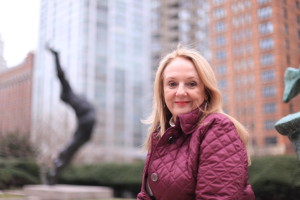Chronic conditions and prolonged illnesses are health-care realities that come with longer life expectancies and an aging population. There”™s a growing need for palliative care ”“ treatment that focuses on easing pain and suffering rather than looking to cure a disease, illness or condition.
There”™s already a shortfall of as many as 18,000 specialists in palliative care, with only one physician to every 20,000 older adults with a chronic condition, according to a recent NPR.org analysis. Mary Beth Morrissey, a health care attorney and researcher, said part of the solution is a collaborative approach from a wide range of medical professionals and physicians, including specialists with nonpalliative focuses.
“It”™s not a one-size-fits-all situation,” Morrissey said during a recent interview at the Westchester campus of Fordham University, where she is helping spearhead a post-graduate certificate on palliative care.

The certificate program, administered through the school”™s Graduate School of Business Administration, is a two-weekend, four-day intensive aimed at mid-career management or early-career professionals on the leadership track. The idea is to educate and equip a broad-base of medical professionals who can then incorporate palliative and long-term care as part of workforce management.
“I think it”™s the first certificate of its kind,” she said. The program, which held its first session over the summer, is run by the Collaborative for Palliative Care, a Westchester-based group that Morrissey founded and for which she is now president.
That group came into existence after the 2005 White House Conference of the Aging with work from Mae Carpenter, commissioner of the county Department of Senior Programs and Services. The collaborative takes the approach of offering broad-based input for advocacy and research for the aging population, Morrissey said. The group hosts conferences and in-person meetings among medical professionals, volunteers and other parties.
Morrissey received her B.A. degree from Fordham, then her J.D. from the university”™s law school. “My career in law was quiet until I got into research,” she said.
From there, she took her interest in health care to the next level, earning a master of public health from New York Medical College”™s School of Public Health and her Ph.D. in gerontological social work from Fordham. She was appointed a fellow of Fordham”™s Global Healthcare Innovation Management Center and focuses her legal practice on aging issues and health policy.
Palliative care has only recently become a priority for health care providers, with mainstream medicine”™s focus the reversal of symptoms or the curing of a disease. There is urgency behind a paradigm shift nationally and locally because of how large the older population has become and how much older it is likely to get. “It has just exploded,” she said.
About 90 million Americans are living with serious illness, according to the Center to Advance Palliative Care, and that number will double in the next quarter century with the aging baby boomer set. Also increasing is the number of “frail elderly” and people older than 85 years old. Chronic illnesses, dementia and long battles with diseases such as cancer and diabetes are increasingly and painfully commonplace.
There are roughly 191,000 seniors living in Westchester County, with that number expected to grow in the coming years by as much as 63,000, according to the advocacy group The Westchester Public/Private Partnership for Aging Services.
Morrissey said the numbers emphasize the need for a new way of doing business. Earlier palliative treatments or discussions about the treatments are beneficial not only to patients, but their families and medical professionals as well.
The Center to Advance Palliative Care website cites statistics of a 2010 study that said patients receiving early palliative care experienced less depression, a better quality of life and lived slightly longer than those who didn”™t receive early care.
There is another benefit to education and discussion, Morrissey said. The workforce shortage for palliative specialists results from several factors, including that most medical students don”™t graduate with the goal of working with elderly patients. Education and an inclusive approach that transcends medical disciplines may change that.
“We want to show them actually it”™s rewarding and meaningful to work with older adults,” she said.
Pace Women”™s Justice Center will be honoring Morrissey and Steven Schurkman from White Plains-based law firm Keane and Beane for their efforts on behalf of the county”™s aging at the center”™s annual “Making a Difference” dinner on Oct. 16 at Tappan Hill in Tarrytown.

















